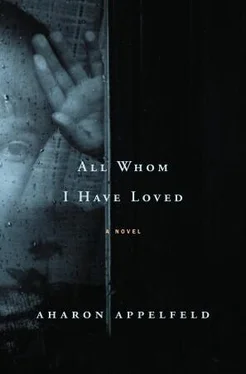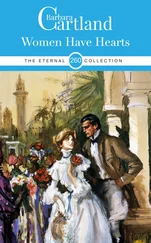I want to ask Father many things, but he's just not there. He works away feverishly, and when he emerges from his studio he's so distracted that he'll ask strange questions; if the truth be told, he actually argues with himself. Victor begs him to put down his palette for an hour or two and go downtown, but Father won't hear of it. He swears that he will not stop until he's filled the quota he set for himself. Victor's face saddens for a moment, and he says, “What can I do?”
Last night we got a telegram from Mother: I'LL COME AT EASTER. Whenever I get news from Mother, my body trembles and my knees go weak. I've told myself so often: Mother is with André and I'm on my own, but I find it hard to stick to this separation. A telegram from Mother awakens my love for her, and I can't move. Not that Father is indifferent to a telegram from Mother. Although he doesn't look at what she's written, he'll ask, “What does Mother write?”
At Easter they crucified Jesus. After his crucifixion he rose again. Mother believes neither in God nor in life after death. I've often heard her say, “Why do people say that God's in the sky? A person has to make his reckoning with himself, and not with God. Believing in God is foolish.”
This kind of talk fills me with fear. It brings to mind pent-up anger and trying to burst through a locked door. When Mother left me with Halina, she warned her, “Don't tell him any tall stories about religion — they addle the brain.” On hearing her injunction, Halina laughed. From the way she laughed, it was clear to me that she would not follow Mother's instructions, but would defy them at the first opportunity, as indeed she did. Halina loved telling me biblical stories about Abraham and Isaac and Jacob; the story of Joseph took days on end. I felt fear mingled with delight whenever she told me these stories; but I would sit beside her, listening.
Father's belief is a mystery to me. When I asked him if there's a God in heaven, he answered, “Supposedly.”
For some reason, his answer saddened me.
In February the canvases smiled upon Father; he painted and was content. Tina's kindly face now peeked out from every picture. I felt sorry that she was surrounded by wicked demons and had to suffer from them, but apparently there's no happiness without pain. While Father was happy with his progress, adding paintings to his body of work, the owner of the gallery suddenly notified Victor that he would not rent out the hall to him, for he had been told that the artist painted decadent pictures. Victor explained — in vain — that it was great art, but the gallery owner not only remained unconvinced, he also threatened to notify the authorities.
I saw Victor and my heart sank. For some days he rushed around from one gallery to another. No one wanted to rent to him. In the end, he found a childhood friend who was prepared to put the downtown coffeehouse he owned at Victor's disposal.
Father went to see the place and was impressed. It was a coffeehouse of the old-fashioned kind, with high ceilings and wide windows. Father declared: “Better an honest coffeehouse than a splendid hall full of snakes.” When Father makes declarations he's either drunk or close to being drunk; his arms lengthen and he waves them in wide circles. The anti-Semites, at any rate, are everywhere, and Victor suffers from them as well. Even though his father had once been the deputy mayor and completely integrated in society, they don't let him forget that his mother had been Jewish and, what's more, a journalist with liberal notions.
We sat in a café and celebrated, and Father drank freely. But the episode had nevertheless left him with a bitter aftertaste. Victor, eager to placate Father, brought us smoked fish, pickled cucumbers, and two loaves of country bread. Throughout the evening he kept speaking of the advantages of the coffeehouse and about the proprietor, who was onequarter Jewish and who did his utmost to help.
Father continued to paint and his mood was even, but at night, when we went downtown, his face would darken and he'd rage: anti-Semites in every corner, all over the place, even in the pleasant coffeehouse where his pictures were going to be exhibited. Victor tried to calm him down, but Father refused to contain his fury, and whenever he ran into an anti-Semite he'd shout, “You filth! You bastard!” Sometimes Father seemed like a soldier fighting on two fronts. At home he fought against the demons, and outside, against the anti-Semites. Victor, it turned out, was more practical than Father. When Father was about to raise his voice, Victor whispered, “You have to ignore them.” Clearly, Father could not do that.
At the end of February, Victor brought over a covered sleigh and he and Father piled the pictures onto it. Little Tina watched them. When the paintings had all been loaded and were covered in blankets, she suddenly burst into tears. Father rushed to embrace her and promised that from then on she would always be his model, and that the next week, right after the opening, he would start preparing a new exhibition. This promise stopped Tina's tears. Eventually she also climbed up onto the sleigh, and all of us went into town to hang the paintings.
It was not long after Father and Victor hung the paintings that the comments of the coffeehouse's clientele could be heard. Father restrained himself at first. But in the end he could no longer keep quiet and he began to shout.
The opening was the following evening. Victor's friends came, as did Father's admirers and a man named Karl Proper, whom I immediately saw was quite special. Father hugged him over and over again. It turned out that he was a famous art researcher. From Father's first exhibition he had been an admirer of his work. It had been a long time since I had seen Father as happy as he was that evening.
I sat next to Tina. Were it not for her large breasts, you would think she was a child. Now she looked down upon everyone from all the walls, at times in the form of a demon and at times in the form of a girl frightened of the demons.
“What grade are you in?” she asked me.
“I don't go to school,” I replied. “I have asthma and Father got me exempted.”
“And do you have a private teacher?”
“No, I learn from books and from workbooks.”
Tina's face was filled with wonder, and she asked nothing more. I gazed at her for the entire evening, and the more I did so, the more enchanted I became.
I must have fallen asleep. After midnight Father carried me to the sleigh. In my sleep, I sensed his excitement and I heard him say, “My friend Victor pulled me up from the depths and restored my faith in God and in man. My thanks go to him both in this world and in the world to come.”
He also mentioned Tina, saying, “She's right in front of you. There is no flesh-and-blood artist who can compete with the Creator of the world. The Creator of the world should keep to himself and we'll keep to ourselves. And as for the gap — you can see it for yourself in my paintings.”
Sometimes what you hear in sleep can be more lucid than what you hear when you're awake. But most of the time sleep is a barrier, and I pick up only the echoes.
The following day we went back to the coffeehouse to see if anyone had bought a painting. As it turned out, just one had been sold: Father's admirer, Karl Proper, had left his gold watch with the proprietor, promising to bring the money within a few days. The press summed up the exhibit in two words: Decadent Art. Father was furious and got drunk, shouting obscenities at the people sitting there. Victor and his friends barely managed to pull him outside. I clearly remember the complete havoc of this scene — it was the first time I had seen Father totally drunk. Victor never left his side, talking to him all the while. “Don't worry, I have enough money to put up seven such exhibitions. I'll buy the pictures and send them to France. In France, they still know real art when they see it.” But Father did not calm down. Not even when he returned home did his rage abate.
Читать дальше












